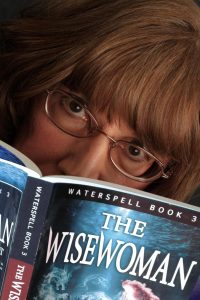For lovers of the written word, good reading vision is a pearl without price. Losing our ability to read, even temporarily, is traumatic for people who Read All The Time. We awake in the morning and read our social media and the news. We sit down to work at our desks and computers, reading and writing on screens or notepads all day. In the evenings we may be back on social media or catching up on email. At bedtime, we have our noses in books, carried away by the power of the written word.
For People of the Book—or for anyone, I suppose, but with particular intensity for People Who Read—eye surgery is terrifying. What if it goes wrong? What if I’m blinded? In allowing a stranger to cut my eyes, have I made the worst mistake of my life?
I recently endured eye surgery, and it has brought me what I dreaded only slightly less than total blindness: I have lost my once-excellent close vision. I had postponed cataract surgery for as long as I possibly could, and when the time came that I must undergo it, the results threw me into a near-panic:
I could no longer see to read.
The surgery took from me my close reading vision and gave me sort-of good distance vision in its stead. Not a fair or advantageous trade, in my world.
Today, I’m in the difficult in-between phase: The surgery is behind me. Thank Godde. My eyes, however, have not yet healed enough that I can go to my optometrist and get the new, post-surgery glasses that will—I hope and trust!—fully restore my reading and computer vision (and correct the astigmatism that blurs my vision at all distances).
Tips for Coping
In hopes of reducing the trauma for other profoundly nearsighted People Who Read, I’ll share what I’ve learned during this ordeal.
1. First and foremost, find a surgeon with good communication skills. My cataract surgeon has a reputation for excellence—both my optometrist and a retina specialist who cleared me for the surgery sang his praises. I, however, cannot recommend him because his communication skills are abysmal. He volunteered no information; he told me nothing of what I could expect before, during, or after the surgery. He did not even tell me what kind of intraocular lens he intended to implant in my eyes. When I asked, he bristled at the question and snappishly said that I was a candidate for only the most basic type, those being fixed monofocal lenses matched to distance vision. From my own research, that is what I had expected to get, but I was taken aback that the surgeon resisted explaining or even discussing my options, or why I had no options.
My first bit of advice to you, therefore, is to find a surgeon who will talk to you.
2. Prepare as well as you can for the extreme imbalance and mental as well as physical strain you will experience after one of your eyes is “corrected” to inflexible, relentless farsightedness, while your “uncorrected” eye remains profoundly nearsighted. During the seven days that elapsed between surgeries on my two eyes, the imbalance kept me in a state bordering on vertigo. I felt queasy and tended to list to port, then to starboard, while walking. I had trouble getting up and down the stairs in my home. I possessed no depth perception and couldn’t tell where I was in space, or where anything else lay. I’d reach for an object and miss it. For seven days I did a lot of napping, because seeing the world through two vastly mismatched eyes made me feel sick.
Astonishingly, at the post-surgery follow-up the day after operating on my left eye, the surgeon said I was OK to drive. Preposterous! And highly irresponsible of him. With the astigmatism in my left eye making everything blurry, the uncorrected 20/400 vision in my right eye making me functionally blind on that side as it overlaid its blurriness on my left side, and with my perpetual vertigo from the imbalance between the two eyes, I was most certainly not OK to drive.
To get myself through that miserable seven days between surgeries, besides sleeping a lot I modified two pairs of my old glasses. On one pair, I taped over the left lens to block out my “corrected” eye so I could see to read with my right eye through my familiar no-line progressive eyeglasses. I modified another pair of old eyeglasses by removing the left lens entirely and taping over the right lens. This helped block out the 20/400 vision of my native right eye so that my brain could focus on seeing with my surgically “corrected” left eye. My right eye is strongly dominant, and during the seven days between surgeries my brain strove mightily to rely primarily on my right eye, as it always has. Only by blocking off that eye could I force my brain to shift its focus to my now-farsighted left eye.

Old eyewear modified for post-surgery needs
3. Besides modifying old eyeglasses to help you cope between surgeries, I also recommend that you ask your surgeon about operating on your dominant eye first. I believe a great deal of my disorientation, discomfort, and incapacity between surgeries could have been alleviated if my dominant eye had been the first to go under the knife. In hindsight, I wonder why determining my dominant eye wasn’t a basic part of the pre-op examination. It seems logical that a surgeon should want to work with a patient’s natural abilities, rather than go against them.
4. Buy reading glasses and have them on hand before your surgery! Being a lifelong wearer (since second grade, anyway) of prescription eyewear, I had never owned a pair of over-the-counter reading glasses. I knew nothing about them. I had no idea what power of reading glasses I needed, but guessed at 3.0 based on this chart at Readers.com.
The second surgery, performed on my right eye exactly one week after my left eye, utterly stripped me of my reading vision. I had been forced to trade my excellent close vision for good-enough distance vision. Now, with both eyes “done” (or done for), I could drive without glasses, but I shall never again be able to read without them. The sacrifice of my close vision saddens me. It seems a big price to pay, for someone who Reads All The Time and who is writing a new novel when she isn’t reading.
Only my cheap mail-order reading glasses kept me from roundly cursing the name of the surgeon who said I had no options and then left me unable to focus on the Written Word. The reading glasses are getting me by, just barely, until I can go to my optometrist for the real thing.

Computer glasses rubber-banded
to empty eyeglass frames
4. Buy computer glasses or multifocal reading glasses. As luck (or my eyes) would have it, I did already own computer glasses that are made to slip over one’s regular eyewear, to sharpen one’s view of a monitor. To use them post-surgery, I removed both lenses from an old pair of my eyeglasses and, with rubber bands, affixed the plastic computer glasses to the empty metal frames. They are enabling me to work at my desktop computer, after a fashion. I’m writing this while peering through them at my monitor. Constantly switching back and forth, however, between computer glasses (to see what’s on my screen) and reading glasses (to see my phone and everything else that’s on my office desk) is driving me to mutter curses at the surgeon once more.
In hopes of finding a more workable solution that will tide me over until I can get proper prescription eyewear, I returned to Readers.com and discovered Foster Grants that claim to combine reading vision, computer vision, and “interacting” vision, all in one. The glasses are on order and due to arrive in less than a week. I will return here and report my opinion of what purports to be a kind of over-the-counter no-line progressive lens.
Seek Empathy
Going back to recommendation No. 1, above, about finding an eye surgeon you can talk to: Patients lucky enough to have a surgeon who understands People of the Book, People Who Read All the Time, may escape many of the terrors and traumas that I have endured. With an understanding surgeon who will seek to maintain your ability to read throughout the process, you may find the surgery—and its aftermath—to be far less stressful than I have. My surgeon simply didn’t care. He brushed aside my concerns and showed no interest whatsoever in my needs and priorities. When I expressed to him my distress over not being able to read post-surgery, he shrugged it off as a trivial thing, not as a loss that strikes at the core of who I am.
For a lover of the written word, an inability to read and write—even a temporary incapacity—is a situation that will induce near-panic. I share my experiences in hopes of helping others to prepare yourselves, as far as possible, for the sacrifices that accompany eye surgery.
I hope you have booklover friends who will understand your cries of anguish when you cannot read and your surgeon doesn’t care. Let me end by quoting a friend who reacted to my pain and frustration as all true People Who Read would react:
“He needs a different profession. For an eye surgeon not to respect his patient’s need to be able to read should be criminal.” Amen.













